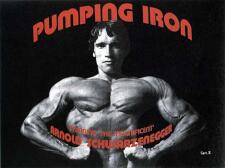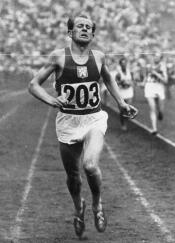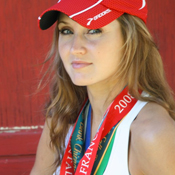Pumping Iron, Running Wisdom
 So, last night I was watching Pumping Iron, a 1977 documentary that follows Arnold Schwarzenegger and Lou Ferrigno in their quest for the 1975 Mr. Olympia title…
So, last night I was watching Pumping Iron, a 1977 documentary that follows Arnold Schwarzenegger and Lou Ferrigno in their quest for the 1975 Mr. Olympia title…
What? It’s a good movie.
Anyway, the film tells the story of several bodybuilders, but it focuses on Schwarzenegger and Ferrigno, who, of course, would later become the governor of California and the Incredible Hulk, respectively. (God bless America.)
You could argue that bodybuilders are antipodal to distance runners. And when it comes to physique, at least at the elite level, they are. I mean, Schwarzenegger’s left arm probably weighs more than Meb Keflezighi. And Haile Gebrselassie. Combined. Then there are the competitions themselves. Runners compete by running. Bodybuilders compete by standing. Posing, if you want to get technical. In fact, the winner of the Mr. Olympia title is decided by a posedown among the finalists.
Posedown. Isn’t that a great word?
I think the idea of a posedown is wonderful and should be implemented in other areas of life, as well. Whose turn is it to take out the trash? Posedown! Who gets the last chocolate chip cookie? Posedown!
But once you get past the strained grunting and gallons of body oil, you begin to realize that perhaps Arnold and Meb aren’t so...
Okay, that’s going too far. Arnold and Meb are absolutely nothing alike. Schwarzenegger (at least in the film) is arrogant. And Austrian. And full of steroids. Meb is none of those things.
“Listen to this part!” Tom said, nudging my arm as I jabbered on about how arrogant and steroidal Schwarzenegger is.
I paused. Schwarzenegger was sitting in a chair—wearing a really great blue-and-red polo shirt, I might add—explaining his philosophy on pain, growth, and what separates champions from everyone else.
“That makes the body grow, going through the pain barrier,” Schwarzenegger tells the camera. “Experiencing pain in your muscles and aching-- and you just go on and go on. And the last two or three or four repetitions—that’s what makes the muscle grow. And that divides one from a champion and not being a champion. lf you can go through this pain barrier, you may get to be a champion. lf you can't go through, forget it.”
Tom looked at me, eyebrows raised. Schwarzenegger continued:
“And that's what most people lack—having the guts. The guts to go in and just say, ‘l'll go through and l don't care what happens.’”
Tom paused the movie. “That’s what you say all the time—about pain and running!”
I had to admit it. Schwarzenegger’s words felt familiar and applicable. Pushing through the final three or four reps (or intervals). Barreling through the pain barrier. Becoming stronger (and faster). Going on even when your body is screaming at you to stop. How many motivational running posters have we pinned to our Facebook walls with the same sentiments?
Schwarzenegger’s words reminded me of another quote, this one by the famous Czechoslovak runner, Emil Zatopek: “It’s at the borders of pain and suffering that the men are separated from the boys.”

Zatopek would know. He won gold in the 5,000-meters, 10,000-meters, and marathon in the 1952 Olympic Games in Helsinki. He entered the marathon at the last minute, on a whim. It was his first time racing the distance. Running alongside the legendary Jim Peters, he asked Peters about the pace. Hoping to exhaust the inexperienced Zatopek, Peters told him it was too slow. According to plan, the rookie sped up. Not according to plan, he never slowed down. Zatopek took first. Peters didn’t finish. To this day, Zatopek is the only person to win a gold medal in those three events in a single Olympics.
Zatopek was known for his “trademark expression of pain.” He wheezed and gasped for breath so loudly he earned the nickname the “Czech Locomotive.” It wasn’t pretty, but Zatopek was a master at breaking through pain barriers.
In another scene from Pumping Iron, Matty Ferrigno, Lou Ferrigno’s dad and coach, watches while his son grunts his way through a tough workout.
“How do you feel, Lou?”
“I feel good.”
“Don’t ever feel sorry for yourself. Remember, if you’re training hard, he may be training twice as hard. You just gotta keep coming back stronger.”
There are so many good things in this quote, but my favorite comes at the beginning: Don’t ever feel sorry for yourself. Self-pity is toxic. It leads to excuses. Excuses lead to inaction. Inaction leads to surrender.
Instead, train hard. Then train harder.
Good stuff, Mr. Ferrigno.
So, yeah. If you have a race coming up—or even a tough workout, for that matter—you may want to check out Pumping Iron. It might provide just the motivation you need.
Or, on the off chance you’re not into docudramas (lame), here’s a recap: Don’t feel sorry for yourself. Keep moving forward. Push past the pain. Break through barriers. Train hard. Then train harder. Be gutsy. And make important decisions via posedowns.
Just lay off the body oil. Seriously.

Amy L. Marxkors is the author of The Lola Papers: Marathons, Misadventures, and How I Became a Serious Runner and Powered By Hope: The Teri Griege Story. Click here to receive Amy's weekly article via email.
Connect With Us
see the latest from Fleet Feet St. Louis